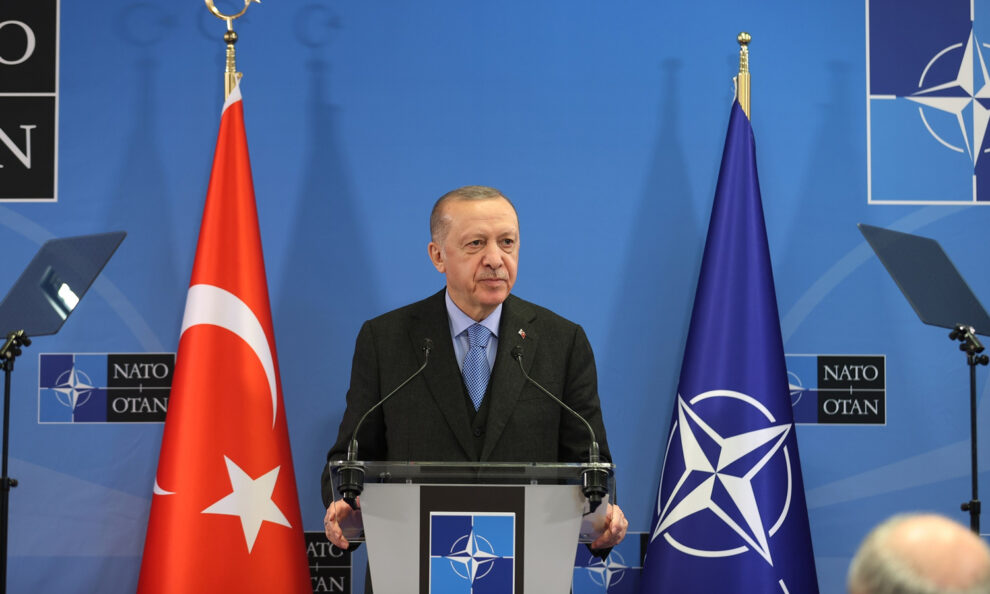Frankfurt, Brussels (21/7 – 37)
Turkish President Recep Tayyip Erdogan has once again reversed course, approving Sweden’s bid to join the legacy European military bloc, having been promised a brace of classic F-16 fighter jets.
This new deal was hammered out at the recent NATO summit in Vilnius, Lithuania, and included a vow by Türkiye to avoid quarrels with ancient enemy Greece also a NATO member.
During a 12 July press conference on in Vilnius, Erdogan touched on several issues important for Türkiye, including ratifying Sweden’s NATO bid, its F-16 jet deal with the US, and a “balancing act” between combatants Russia and Ukraine. Erdogan agreed to forward ratification of Sweden’s NATO bid to Parliament when it reopens in October, on the condition Stockholm provides a “road map” before ratification.
Ankara’s approval coincided with Sweden pledging support to update Turkey’s customs agreement with the European Union and its desire to approve visa-free travel throughout the EU for its citizens, a tricky matter in the current political climate, where third-world immigration is a hot potato.
Erdogan also hopes (against hope) that Stockholm will clamp down on members of the outlawed Kurdistan Workers’ Party (PKK), a grouping banned as “terrorists” in Türkiye (others call them “freedom fighters”).
Sweden may have reluctantly agreed, while in fact they are not known for clamping down on anything – average Swedes walk the streets of many cities today scared half to death of violent crime and Islamic “no-go zones”. Few migrants convicted of violent crimes in tolerant Sweden ever get deported, either, instead enjoying the “country club atmosphere” of Scandinavian prisons.
Before departing for the NATO summit, Erdogan also said that he would arrange to fulfill requirements for Türkiye to join the European Union; after decades of reluctance, traditionally neutral Sweden is about to join, following Finland’s entry earlier this year.
Turkey has been eager to benefit from EU membership in one form or another since 1987, but current members are reluctant to let the large nation in.
Hours after Ankara said it would allow Stockholm into the bloc, the US announced it would proceed with the transfer of elderly F-16 fighter jets to Turkey, the likely trade-off for Ankara’s green light. However, US President Biden cannot go ahead with the deal for the planes without approval from the top Republicans and Democrats on the Senate Foreign Relations and House Foreign Affairs committees. Some US lawmakers have concern on how Turkey might deploy any US-provided fighters, considering its objectives in warring Arab countries often diverge from those of the USA.
Note that a dozen second-hand 47-year-old designed F-16 “Fighting Falcons” were sold off by Netherlands and Norway by each country as they were retired in 2022, in the “F-16 End Life of Type (ELOT)” program. These fighter aircraft will be going to the Ukraine, to support their campaign against Russian. The Dutch will meanwhile be acquiring either the troubled F35 fighter jets or possibly the more conventional F22 for their air force.
Greece, alarmed at such developments, has sought guarantees that the Turkish F-16s will not be used against Athens, as the two nations are engaged in an oh-so-familiar maritime waters dispute over the Aegean Sea.
While Greece has accused Turkey of violating its airspace more than 10,000 times last year, Turkey has threatened areas in Syria held by Kurds, a minority which the U.S. considers useful allies.
Taking advantage of the cooperative climate at the NATO Summit, Turkey resumed talks with Greece, after more than a year of tensions between the historic foes, at odds for decades over maritime boundaries, overlapping claims to their continental shelves and the endless and impossible Cyprus dispute. Nevertheless, Greece provided emergency assistance to Türkiye following the recent catastrophic earthquake, calming tensions somewhat.
Following the Vilnius meeting, the neighboring NATO members pledged to “activate multiple channels of communication” to settle issues; a joint statement announced a high-level Cooperation Council scheduled for Thessaloniki this fall.































